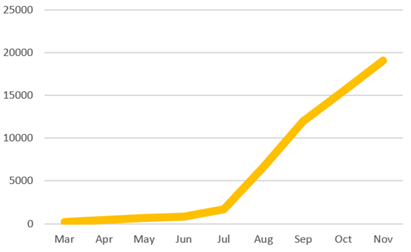VISN 4 MIRECC Newsflash
Winter 2022
MESSAGE FROM THE DIRECTOR |
Happy New Year to all, and I hope you had a restful holiday season.
I continue to be proud of the work our Center has been doing each day to improve the lives of Veterans through our research, education, and clinical missions.
In fiscal-year 2021, our Center worked on 54 active VA IRB-approved research projects, with $4.1 million in on-mission external grant funding. We authored more than 165 peer-reviewed publications and delivered 50 educational and clinical presentations. We supported 12 clinical demonstration projects. We accomplished this all while navigating research life during a pandemic. I look forward to another productive year in 2022!
David Oslin, M.D.
Director, VISN 4 MIRECC
SPOTLIGHT: BHL TOUCH |
BHL Touch, a VA-approved web-based tool supporting measurement-based mental health care, now offers a new mode for Veterans to complete assessments anytime using their own device, in addition to traditional iPad entry in the office.
This new feature allows providers to text or email a secure link to a Veteran for convenient completion from anywhere. When the requested assessments are completed, the provider is immediately notified via email, and they can then review the results, track the patient’s progress over time, and seamlessly upload them to the electronic health record.
The benefits of this technology include:
- expanded implementation of MBC
- more accurate and efficient documentation of care
- increased overall patient and provider satisfaction.
This tool for delivering care has been proven to be helpful during the recent COVID-19 pandemic, during which care for many patients shifted to telehealth. Since its launch in March 2021, the number of total interviews completed through BHL each month has climbed significantly (see graph below).
The VISN 4 MIRECC has developed many educational resources for providers, including training videos and documents to help providers get the most out of this new tool. Our MIRECC also conducts twice-monthly live virtual trainings. Visit the BHL Touch SharePoint [VA intranet only] to learn more.
We’ve received some great feedback from BHL Touch users across VA:
FUNDING UPDATE |
Vishwajit Nimgaonkar, M.D. and Gretchen Haas, Ph.D. were awarded a 5-year VA RR&D Merit Award for their project, Exercise-Based Program for Rehabilitation of Veterans with Severe Mental Illness. This project evaluates the impact of yoga versus wellness intervention on cognition and community functioning.
Gretchen Haas, Ph.D. and Lora McClain, Ph.D. were awarded MVP Local Site Investigator Beta Test MVP projects in Data Commons. The $50,000 award will fund their study, Using GWAS to Understand Why Individuals with Schizophrenia are at Greater Risk for Type 2 Diabetes Mellitus, and Does Risk Vary by Ancestry?
PUBLISHING HIGHLIGHTS |
Khazanov GK, Forster SE, DePhilippis D, McKay JR. Increasing the Impact of Interventions Incentivizing Psychiatric Treatment Engagement: Challenges and Opportunities. Psychiatric Services. September 2021. [link]
Longenecker JM, Pokorny VJ, Kang SS, Olman CA, Sponheim SR. Self-Reported Perceptual Aberrations in Psychosis Map to Event-Related Potentials and Semantic Appraisals of Objects. Journal of Abnormal Psychology. October 2021. [link]
Scott JC, Lynch KG, Cenkner DP, Kehle-Forbes SM, Polusny MA, Gur RC, Chen S, Foa EB, Oslin DW. Neurocognitive Predictors of Treatment Outcomes in Psychotherapy for Comorbid PTSD and Substance Use Disorders. Journal of Consulting and Clinical Psychiatry. November 2021. [link]
Prasad K, Rubin J, Mitra A, Lewis M, Theis N, Muldoon B, Iyengar S, Cape J. Structural Covariance Networks in Schizophrenia: A Systematic Review. Schizophrenia Research. December 2021. [link]
Ramsey CM, Lynch KG, Gehrman PR, Vairavan S, Narayan VA, Li QS, Oslin DW. Daily Steps and Depressive Symptoms: A Longitudinal Evaluation of Patients with Major Depressive Disorder in the Precision Medicine in Mental Health Care Study. Journal of Affective Disorders. December 2021. [link]
Kranzler HR, Zhou H, Kember RL. Identifying and Reducing Bias in Genome-Wide Association Studies of Alcohol-Related Traits. American Journal of Psychiatry. January 2022. [link]



















